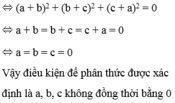Hãy nhập câu hỏi của bạn vào đây, nếu là tài khoản VIP, bạn sẽ được ưu tiên trả lời.

Bài 1:
a) x≠2
Bài 2:
a) x≠0;x≠5
b) x2−10x+25x2−5x=(x−5)2x(x−5)=x−5x
c) Để phân thức có giá trị nguyên thì x−5x phải có giá trị nguyên.
=> x=−5
Bài 3:
a) (x+12x−2+3x2−1−x+32x+2)⋅(4x2−45)
=(x+12(x−1)+3(x−1)(x+1)−x+32(x+1))⋅2(2x2−2)5
=(x+1)2+6−(x−1)(x+3)2(x−1)(x+1)⋅2⋅2(x2−1)5
=(x+1)2+6−(x2+3x−x−3)(x−1)(x+1)⋅2(x−1)(x+1)5
=[(x+1)2+6−(x2+2x−3)]⋅25
=[(x+1)2+6−x2−2x+3]⋅25
=[(x+1)2+9−x2−2x]⋅25
=2(x+1)25+185−25x2−45x
=2(x2+2x+1)5+185−25x2−45x
=2x2+4x+25+185−25x2−45x
=2x2+4x+2+185−25x2−45x
=2x2+4x+205−25x2−45x
c) tự làm, đkxđ: x≠1;x≠−1

1.a)\(\frac{x^3}{x^2-4}-\frac{x}{x-2}-\frac{2}{x+2}\)
\(=\frac{x^3}{\left(x+2\right)\left(x-2\right)}-\frac{x}{x-2}-\frac{2}{x+2}\)
Để biểu thức được xác định thì:\(\left(x+2\right)\left(x-2\right)\ne0\)\(\Rightarrow x\ne\pm2\)
\(\left(x+2\right)\ne0\Rightarrow x\ne-2\)
\(\left(x-2\right)\ne0\Rightarrow x\ne2\)
Vậy để biểu thức xác định thì : \(x\ne\pm2\)
b) để C=0 thì ....
1, c , bn Nguyễn Hữu Triết chưa lm xong
ta có : \(/x-5/=2\)
\(\Rightarrow\orbr{\begin{cases}x-5=2\\x-5=-2\end{cases}}\Rightarrow\orbr{\begin{cases}x=7\\x=3\end{cases}}\)
thay x = 7 vào biểu thứcC
\(\Rightarrow C=\frac{4.7^2\left(2-7\right)}{\left(7-3\right)\left(2+7\right)}=\frac{-988}{36}=\frac{-247}{9}\)KL :>...
thay x = 3 vào C
\(\Rightarrow C=\frac{4.3^2\left(2-3\right)}{\left(3-3\right)\left(3+7\right)}\)
=> ko tìm đc giá trị C tại x = 3

Câu 6:
ĐKXĐ: \(x\ne-\dfrac{1}{3}\)
Để \(\dfrac{9x+4}{3x+1}\in Z\) thì \(9x+4⋮3x+1\)
=>\(9x+3+1⋮3x+1\)
=>\(1⋮3x+1\)
=>\(3x+1\in\left\{1;-1\right\}\)
=>\(3x\in\left\{0;-2\right\}\)
=>\(x\in\left\{0;-\dfrac{2}{3}\right\}\)
mà x nguyên
nên x=0
Câu 2:
a: ĐKXĐ: \(x\notin\left\{2;-2;0\right\}\)
b: \(A=\left(\dfrac{1}{x+2}-\dfrac{2x}{4-x^2}+\dfrac{1}{x-2}\right)\cdot\dfrac{x^2-4x+4}{4x}\)
\(=\left(\dfrac{1}{x+2}+\dfrac{2x}{\left(x-2\right)\left(x+2\right)}+\dfrac{1}{x-2}\right)\cdot\dfrac{\left(x-2\right)^2}{4x}\)
\(=\dfrac{x-2+2x+x+2}{\left(x+2\right)\left(x-2\right)}\cdot\dfrac{\left(x-2\right)^2}{4x}\)
\(=\dfrac{4x\left(x-2\right)}{4x\left(x+2\right)}=\dfrac{x-2}{x+2}\)

a. ĐK \(\hept{\begin{cases}x\ne0\\x+5\ne0\end{cases}\Rightarrow\hept{\begin{cases}x\ne0\\x\ne-5\end{cases}}}\)
b. \(A=\frac{x^2+2x}{2x\left(x+5\right)}+\frac{x-5}{x}+\frac{50-5x}{2x\left(x+5\right)}=\frac{x\left(x^2+2x\right)+2\left(x-5\right)\left(x+5\right)+50-5x}{2x\left(x+5\right)}\)
\(=\frac{x^3+2x^2+2x^2-50+50-5x}{2x\left(x+5\right)}=\frac{x^3+4x^2-5x}{2x\left(x+5\right)}\)
\(=\frac{x\left(x+5\right)\left(x-1\right)}{2x\left(x+5\right)}=\frac{x-1}{2}\)
Để \(A=1\Rightarrow\frac{x-1}{2}=1\Rightarrow x=3\)
Để \(A=-3\Rightarrow\frac{x-1}{2}=-3\Rightarrow x=-5\)
Vậy với x=3 thì A=1 ; với x=-5 thì A=-3




Lời giải:
Để phân thức trên xác định thì:
$(a+b+c)^2-(ab+bc+ac)=a^2+b^2+c^2+ab+bc+ac=\frac{(a+b)^2+(b+c)^2+(c+a)^2}{2}\neq 0$
$\Leftrightarrow (a+b)^2+(b+c)^2+(c+a)^2\neq 0$
$\Leftrightarrow a+b, b+c, c+a$ không đồng thời cùng bằng $0$
$\Leftrightarrow a,b,c$ không đồng thời cùng bằng $0$